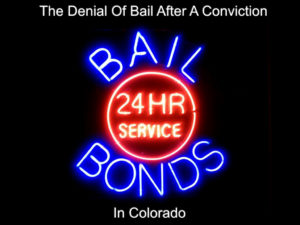






Colorado Criminal Law – The Denial Of Bail After Trial
By H. Michael Steinberg Colorado Criminal Defense Lawyer – Attorney
 Colorado Criminal Law – The Denial Of Bail After Trial – While most Judge’s will continue the right to bail after a Colorado criminal conviction – there are circumstances when there may be a denial of bail and a remand of the Defendant to the county jail.
Colorado Criminal Law – The Denial Of Bail After Trial – While most Judge’s will continue the right to bail after a Colorado criminal conviction – there are circumstances when there may be a denial of bail and a remand of the Defendant to the county jail.
This article addresses Colorado’s Bail Laws following guilty verdicts for Colorado criminal trials.
Colorado Bail Laws – Right To Bail – Ask – Is This Before Or After A Conviction?
I have written articles on how bail works in Colorado, but I have never closely addressed what can occur after a plea bargain to certain crimes or more importantly because of the possible surprise element, what can happen when a jury returns an unfavorable verdict.
The Basic Rule is this – There is no constitutional right to bail after conviction in Colorado. Colo. Const. art. II, § 19(2.5)(a).
The “shall be bailable” language found in Colorado Constitution article II, section 19(1) “gives the criminally accused the right to a bail bond, pending adjudication of the charges against him . .”
The origin of the phrase “shall be bailable” language arises out of the “presumption of innocence’ since
“….the traditional right to freedom before conviction permits the unhampered preparation of a defense, and serves to prevent the infliction of punishment prior to conviction. Unless this right to bail before trial is preserved, the presumption of innocence, secured only after centuries of struggle, would lose its meaning.”
Following a criminal conviction, a Defendant loses the presumption of innocence and therefore the constitutional right to bail is no longer applies. The power to grant bail then becomes a creature of statute and left, by law, to the sound discretion of the trial court. § 16-4-201.5, C.R.S.
To repeat this point – after a conviction, a Trial Judge has the right to decide whether or not to grant bail pending sentencing or appeal. Most Judges, if they have the authority to grant continued bail (with the agreement of the person or company posting the bond – called a “consent of surety”) WILL continue the right to remain on bail until sentencing.
But there are certain crimes that are not “bailable” immediately after a jury verdict for that crime comes back.
No bail is allowed for persons convicted of:
- Murder
- Any felony sexual assault involving the use of a deadly weapon
- Any felony sexual assault committed against a child who is under fifteen years of age
- A felony crime of violence or
- Any felony, if the person used a firearm during its commission.
- A crime of possession of a weapon by a previous offender,
- The crime of child abuse, (as described in section 18-6-401(7) (a) (I), C.R.S.)
- A class 5 felony act of domestic violence, as described in section 18-6-801(7) ;
- A second or subsequent offense for stalking that occurs within seven years after the date of a prior offense for which the person was convicted, as described in section 18-3-602(3)(b) ; or
A Trial Judge may also be precluded from setting bail after a Colorado criminal conviction for other felonies unless it finds:
- The person is unlikely to flee;
- The person does not pose a danger to the safety of any person or the community; and
- If pending an appeal, the appeal is not frivolous and is not pursued for the purpose of delay.
The Law Governing This Area Is Found – (As Amended On August 9, 2017) At Section 16-4-201.5 Colorado Revised Statutes
Always read the law:
§ 16-4-201.5. [Effective 8/9/2017] Right to Bail after a Conviction – Exceptions
(1) The court may grant bail after a person is convicted, pending sentencing or appeal, only as provided by this part 2; except that no bail is allowed for persons convicted of:
(a) Murder;
(b) Any felony sexual assault involving the use of a deadly weapon;
(c) Any felony sexual assault committed against a child who is under fifteen years of age;
(d) A crime of violence, as defined in section 18-1.3-406, C.R.S.;
(e) Any felony during the commission of which the person used a firearm;
(f) A crime of possession of a weapon by a previous offender, as described in section 18-12-108(2)(b), (2)(c), (4)(b), (4)(c), or (5) ;
(g) Child abuse, as described in section 18-6-401(7) (a) (I), C.R.S.
(h) A class 5 felony act of domestic violence, as described in section 18-6-801(7) ;
(i) A second or subsequent offense for stalking that occurs within seven years after the date of a prior offense for which the person was convicted, as described in section 18-3-602(3)(b) ; or
(j) Stalking when there was a temporary or permanent protection order, injunction, or condition of bond, probation, or parole or any other court order in effect that protected the victim from the person, including but not limited to stalking, as described in section 18-3-602(5).
(2) The court shall not set bail that is otherwise allowed pursuant to subsection (1) of this section unless the court finds that:
(a) The person is unlikely to flee and does not pose a danger to the safety of any person or the community; and
(b) The appeal is not frivolous or is not pursued for the purpose of delay.
(3) The provisions of this section shall apply to offenses committed on or after January 1, 1995.
If a Trial Judge decides to deny bail after conviction – that decision – to grant or to deny bond – is reviewed on appeal under what is called an “abuse of discretion” standard. Practically speaking, that means the decision will NOT be reversed by another Judge or Court of Appeals absent very extreme circumstances.
The Factors That Should Matter To The Judge In Deciding To Continue Bail Following A Conviction
While there is no specific listing of factors that a Judge must consider in making the decision to grant – or deny bail – following a conviction, it could be persuasively argued that a Colorado statute that governs the criteria that should be applied should a Defendant decide to appeal a jury’s verdict seems to have application at the time the Judge makes this important decision.
Those criteria ae found in the Colorado Statute 16-4-202. Here is the law:
§ 16-4-202. Appeal Bond Hearing – Factors to Be Considered
(1) The court shall consider the following factors in deciding whether or not an appeal bond should be granted and determining the type of bond and conditions of release required:
(a) The nature and circumstances of the offense before the court and the sentence imposed for that offense;
(b) The defendant’s length of residence in the community;
(c) The defendant’s employment, family ties, character, reputation, and mental condition;
(d) The defendant’s past criminal record and record of appearance at court proceedings;
(e) Any showing of intimidation or harassment of witnesses or potential witnesses, or likelihood that the defendant will harm or threaten any person having a part in the trial resulting in conviction;
(f) Any other criminal charges pending against the defendant and the potential sentences should the defendant be convicted of those charges;
(g) The circumstances of, and sentences imposed in, any criminal case in which the defendant has been convicted but execution stayed pending appeal;
(h) The likelihood that the defendant will commit additional criminal offenses during the pendency of such defendant’s appeal; and
(i) The defendant’s likelihood of success on appeal.
Summary And Conclusion – Colorado Criminal Law – The Denial Of Bail After Trial
In Colorado, a Defendant is eligible for bond under one of two statutes: Section 16-4-102, C.R.S. — which governs bond “before conviction” — and Sections 16-4-201, C.R.S. and 16-4-201.5 — which govern bond “after conviction.” A Defendant should always respectfully ask a Court to grant bail pursuant to the latter authority following an adverse jury verdict following the criteria in the Appeal Bond statute and NEVER take it for granted that a Judge will automatically continue bond.
Colorado Criminal Law – The Denial Of Bail After Trial
If you found any of the information I have provided on this web page article helpful please click my Plus+1 or the Share buttons for Twitter and Facebook below so that others may also find it.
The reader is admonished that Colorado criminal law, like criminal law in every state and at the Federal level, changes constantly. The article appearing above was accurate at the time it was drafted but it cannot account for changes occurring after it was uploaded.
If, after reading this article, you have questions about your case and would like to consider retaining our law firm, we invite you to contact us at the Steinberg Colorado Criminal Defense Law Firm – 303-627-7777.
Never stop fighting – never stop believing in yourself and your right to due process of law. You will not be alone in court, H. Michael will be at your side every step of the way – advocating for justice and the best possible result in your case. H. Michael Steinberg is passionate about criminal defense. His extensive knowledge and experience of Colorado Criminal Law gives him the edge you need to properly handle your case
 ABOUT THE AUTHOR: H. Michael Steinberg – Email The Author at:
ABOUT THE AUTHOR: H. Michael Steinberg – Email The Author at:
A Denver Colorado Criminal Defense Lawyer – or call his office at 303-627-7777 during business hours – or call his cell if you cannot wait and need his immediate assistance – please call 720-220-2277.
“A good criminal defense lawyer is someone who devotes themselves to their client’s case from beginning to end, always realizing that this case is the most important thing in that client’s life.”
You should be careful to make a responsible choice in selecting a Colorado Criminal Defense Lawyer. We encourage you to “vet” our firm. Over the last 40 plus years – by focusing ONLY on Colorado criminal law – H. Michael has had the necessary time to commit to the task of constantly updating himself on nearly every area of criminal law, to include Colorado criminal law and procedure and trial and courtroom practice.
Putting more than 40 years of Colorado criminal defense experience to work for you.
H. Michael works hard to get his clients the best possible results in and out of the courtroom. He has written, and continues to write, extensively on Colorado criminal law and he hopes this article helps you in some small way – Colorado Criminal Law – The Denial Of Bail After Trial.
Other Articles of Interest:
- Colorado Bail Bond Laws and Rules
- Bail – or Bonding Out
- Colorado State Felonies – Criminal Impersonation (18-5-113)
- Colorado State Crimes – Felony Criminal Impersonation (18-5-113)
- The Charging Decision and Control Of The Case – Who Really Controls The Course Of Colorado Criminal Cases?






















